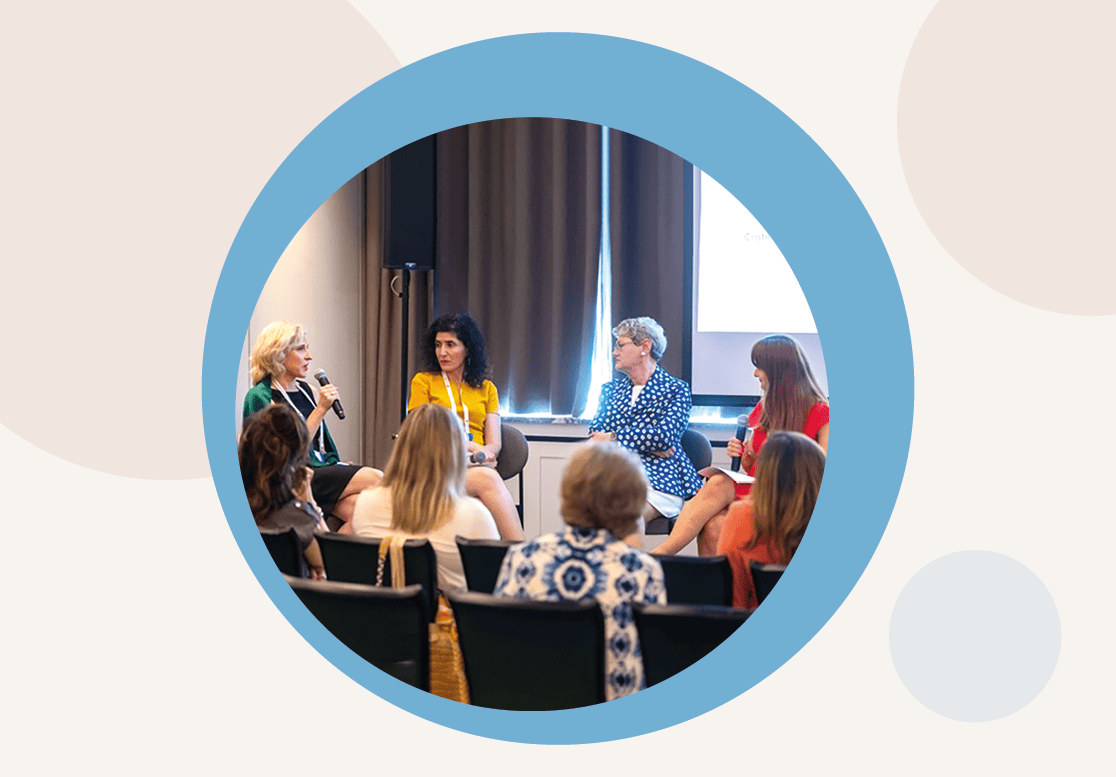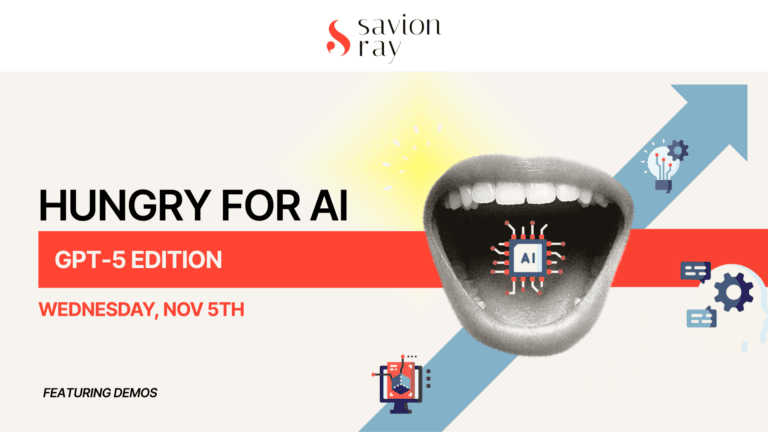When the European Association of Communications Directors (EACD) announced that resilience would be one of the central themes for their 2023 Summit, we knew immediately that there was no way we could pass up the opportunity to be part of this conversation. We are intimately familiar with the need for resilience — an unfortunate but necessary truth to which almost any woman in the world of strategic comms can attest.
By spotlighting the stories of three incredible and very accomplished women in strategic comms, Savion Ray jumped on this chance to expose the structural challenges of our industry that require women to cultivate layers of resilience throughout their careers.
Triumph in the face of adversity
Our sponsored panel Women in Strategic Comms: Narratives of Resilience served double-duty as both a wake-up call to the persistent inequality of the comms industry as well as a love letter to the women pushing through it to success.
Featuring NATO Spokesperson Oana Lungescu, UPS Senior Vice President of Corporate Affairs Cristina Falcone, and Vodafone Group Head of EU Affairs and Relations Erzsébet Fitori, the panel carved out space to celebrate the ways these women have achieved success in spite of the obstacles set against them.
At the same time, we sought to emphasise the need for change going forward — to level the playing field with the support of our male colleagues to create equal opportunities for aspiring comms professionals of all genders. There is no need for the challenges hindering the women in comms of today to persist in the lives of the next generations.
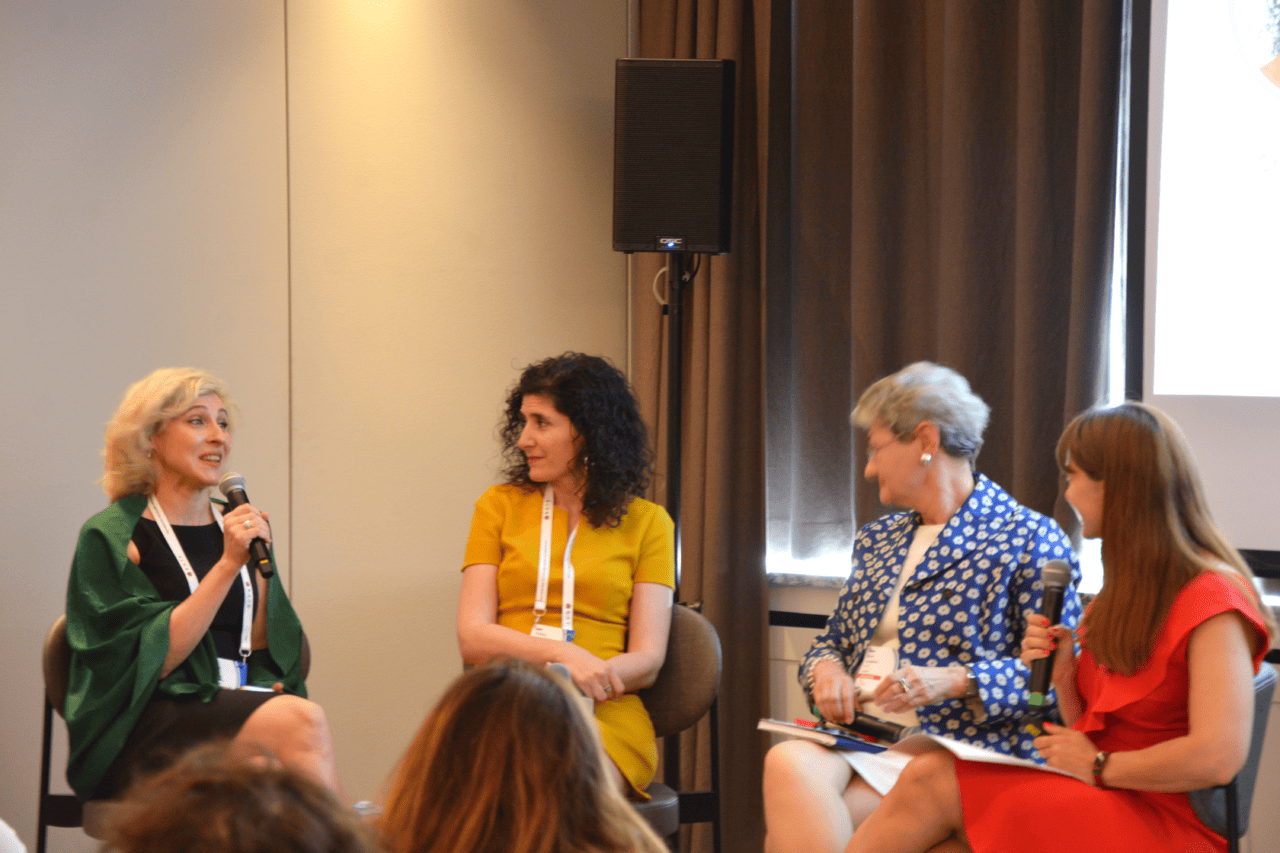
Narrative 1: Navigating through polycrises
One theme that emerged throughout the panel was that of the polycrisis: the convergence of multiple crises that compound one another, creating a tempestuous whole that truly exceeds the sum of its parts. Consider how the COVID-19 pandemic and the Russian invasion of Ukraine combined to exacerbate the global energy crisis, which in turn spiked shipping costs and further disrupted global supply chains.
Oana Lungescu is no stranger to the polycrisis. Growing up under the Ceaușescu government in Romania, Oana never dreamed she’d one day play a leading role in a global strategic alliance, much less build a career outside her hometown. But the resilience she’d had to develop kept her afloat, even through a prison term in South America while working as a journalist with the BBC.
“Women work harder [with a] high ranking in commitment and loyalty. But is it because we can’t afford to fail? Isn’t failure resilience?” Oana asked rhetorically. When there’s nothing to protect you when you fall, the only choice is to learn how to bounce back.
Narrative 2: Refusing to give up
Women aren’t born more resilient than men — they develop resilience as a necessary response to the additional challenges they face both within the workplace as well as in other areas of their lives.
Erzsébet Fitori has applied this mindset to fuel her career in an industry with a striking gender leadership gap. “I virtually never give up,” she explained. “A no is a temporary no. Negotiation can bring change.” It’s this attitude that led her into her first directorship role at the early age of just 29: “I was given a choice: a significant salary increase, or the title with no salary increase. I went for the director position, and the salary followed.”
While no one would call this choice equitable — a raise without recognition, or additional responsibilities without remuneration — Fitori found a way to shape her circumstances to her eventual benefit. It’s a strategy that has yet to let her down throughout her career, whether as ECTA Director, FTTH Director General, or now at Vodafone.
Narrative 3: Paying it forward
“I get by with a little help from my friends,” sang Paul McCartney on the Beatles’ landmark album Sgt. Pepper’s Lonely Hearts Club Band. And in the professional world, we can all use the support of a trusted mentor. The drive to help others realise their potential is what keeps Cristina Falcone going in her career.
Early on, Cristina struggled with impostor syndrome: the persistent self-doubting of one’s skills and accomplishments. The additional barriers of institutional gender bias can amplify the effects of impostor syndrome on women, leading to doubt spirals and potentially even self-sabotage.
But it was the support of her mentor that empowered Cristina to believe in herself. “A mentor propelled me forward at times when I didn’t quite see my potential,” she remarked. “I now speak out when I see potential and ensure visibility for women’s work.” Having experienced the power of positive mentorship herself, Cristina now seeks to play a similar role in as many younger lives as she can.
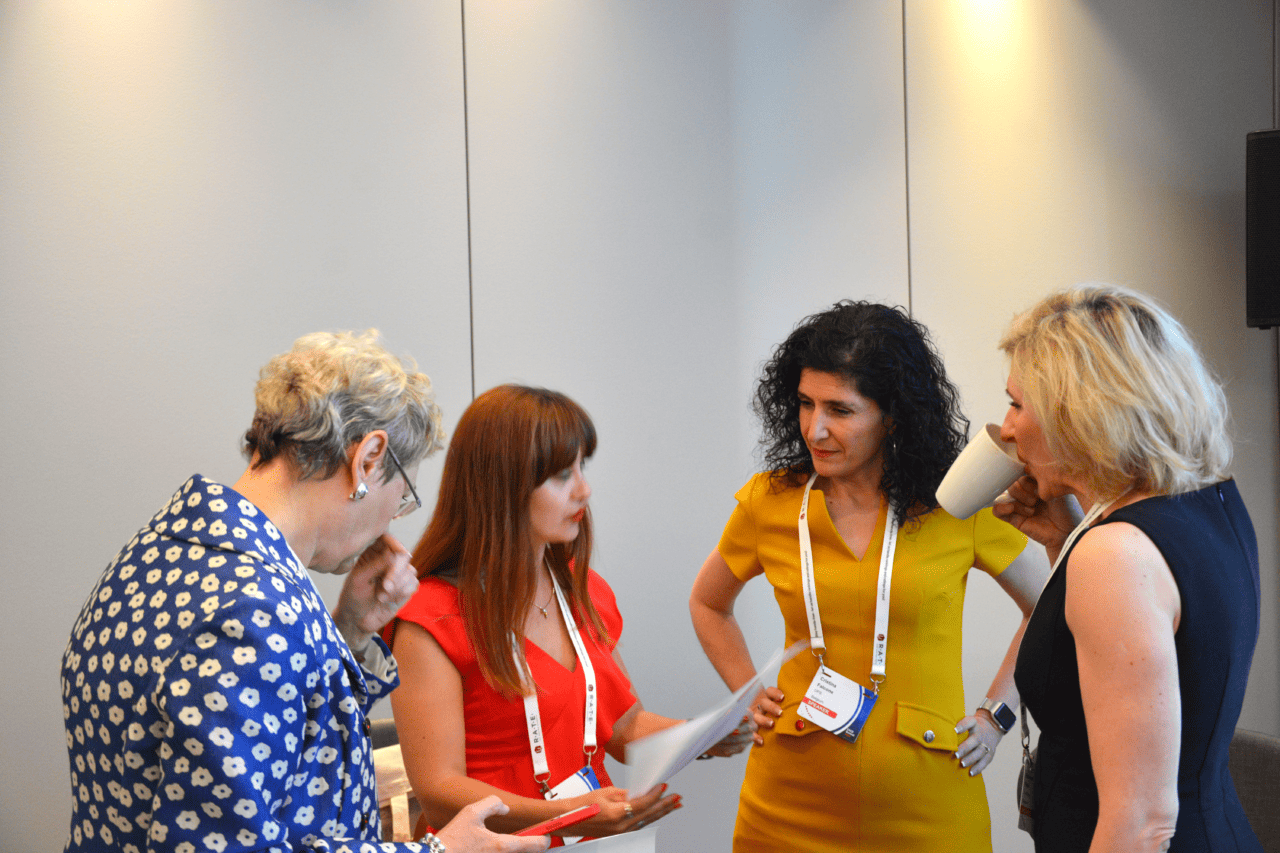
Finding truth in past choices
Mss. Lugescu, Falcone, and Fitori lead their respective organisations through times of crisis with effective strategic insights and personal resilience. At the same time, they’re all keenly aware of where they came from and how they navigated to their current achievements. The advice they had for their younger selves is just as relevant today for anyone entering the strategic comms world.
“Think bigger than the circumstances and the context in which you are,” said Oana. Her life has been characterised by her ability to transcend boundaries and resist the smothering grip of oppression, from her upbringing through her work as a journalist to now.
Erzsébet encouraged her younger self to worry less about what the future holds and instead focus on getting the most out of every moment. “Don’t worry so much about how things will turn out,” she said, reflecting on her fateful choice to leap into a directorship role and trusting that her compensation would follow. “Enjoy the present because hard work will pay off at the end.”
Cristina reflected on her early battles with impostor syndrome. ”Believe in yourself, you have got what it takes. One day you will lead this very department,” she said, remembering the moment when she first returned to the UPS office she’d joined as a new hire — only now, she leads the team as a Senior VP. It’s why she’s so committed today to uplift younger talent in her network.
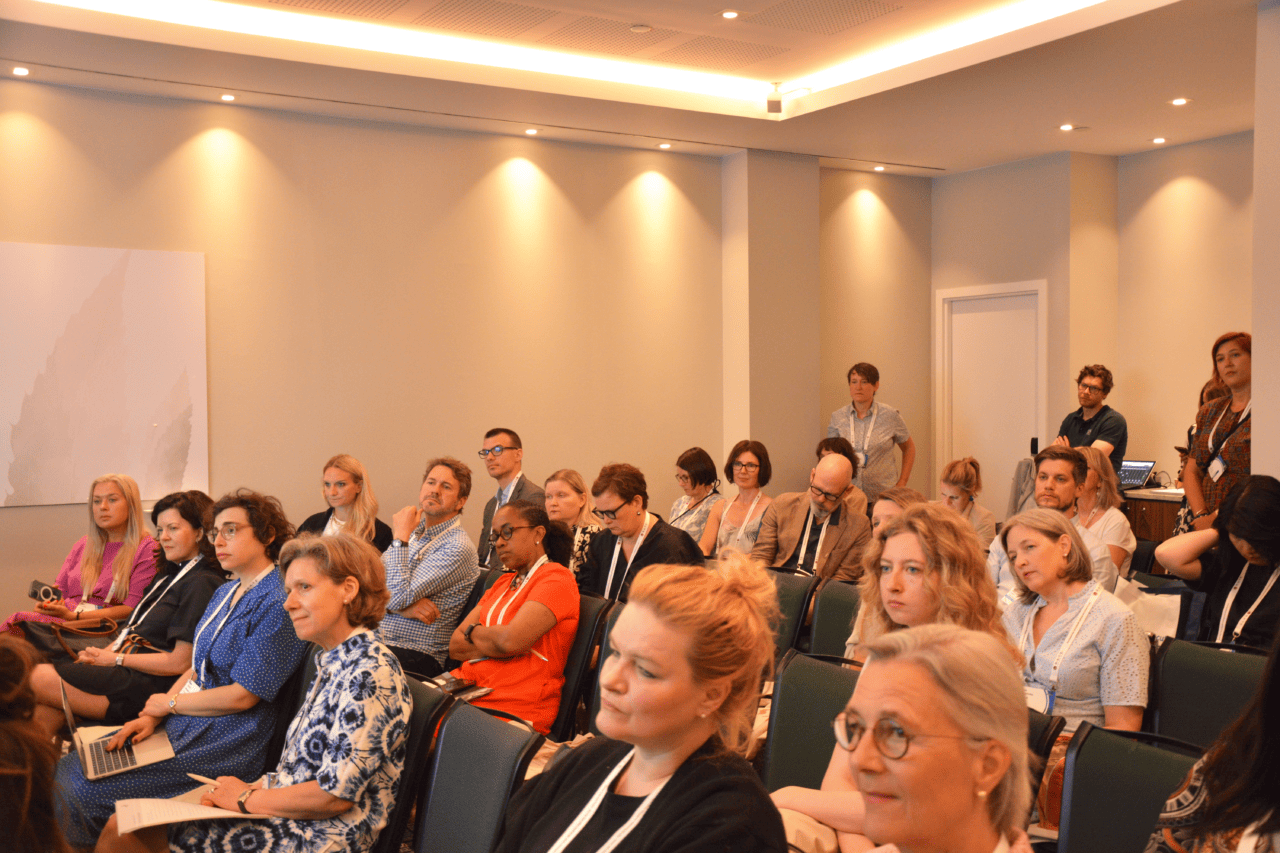
The only way out is through
The roadmap to an equitable future requires that organisations intentionally hire and promote diverse talent, create supportive environments in which they can thrive, and recognize the value of soft skills in crisis management. We must remove the institutional barriers and biases that unfairly position men for success while holding back colleagues of other genders.
Oana Lugescu was optimistic about the future, citing the many women in strategic and technical roles at NATO as well as the alliance’s progress in supporting its LGBTQIA+ personnel. Meanwhile, Erzsébet Fitori highlighted the need for ongoing persistence, noting the ability of men to “fail upwards” as “female talent gets lost.” Fairness and work-life balance are crucial in the struggle for equity, she stated.
Crucially, the struggle for equity isn’t just a fight for women. Male voices united in allyship are essential to ongoing progress. “If we want to stop having these conversations, we need to drive change now so new generations [of] women apply themselves,” said Cristina Falcone. “Men [must be our] allies in this.”
For the first time in history, over 10% of Fortune 500 companies are led by women. And between 30% and 40% of chief communications officers are women. There’s still a long road ahead, but we’ve also come a long way. If there’s one thing to be learned from our panellists, it’s that there are no shortcuts for women in comms. It just takes a little extra resilience.
Do you have a story that needs telling? We’d love to help — get in touch and start a conversation with us today.
